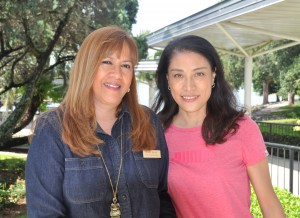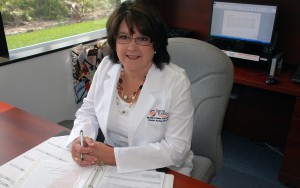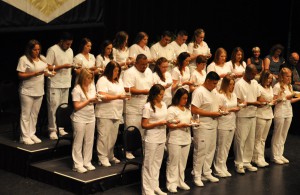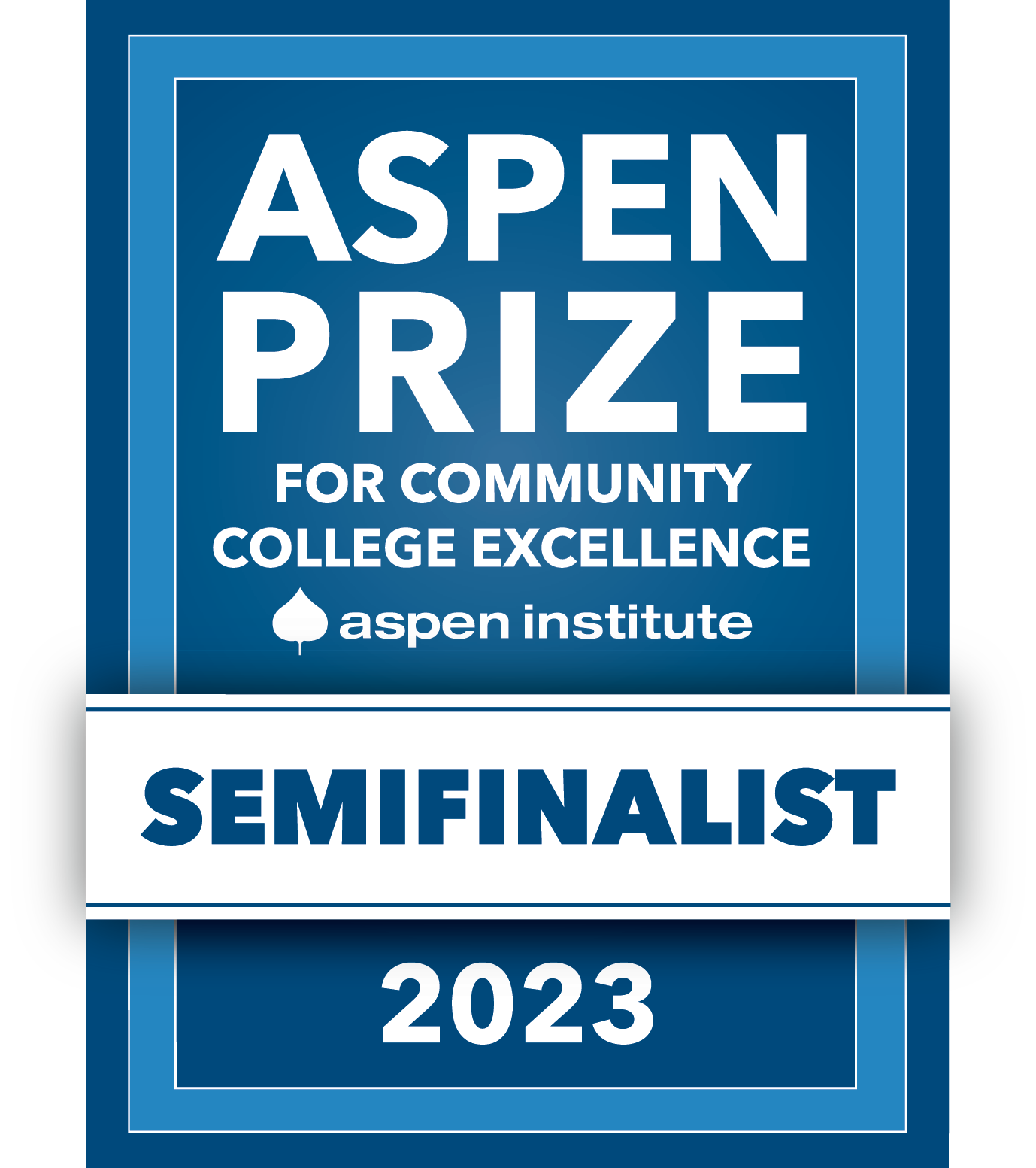AVON PARK, Fla. – Aug. 31, 2016 – South Florida State College graduated 12 law enforcement officers on Aug. 30, handing them their diploma, challenge coins, and advice as they prepare for their first assignments.
The 12 cadets of Basic Law Enforcement Class 248 filed into the SFSC University Center auditorium on the Highlands Campus for the 6 p.m. ceremony and stood at attention while a color guard presented the Stars and Stripes. The auditorium’s seats were filled families, well-wishers, and law enforcement officer from surrounding counties.
Before picking up their diplomas, the cadets heard a send-off speech from Chris Velasquez, the chief of the Lake Wales Police Department. Velasquez got his start in law enforcement after he graduated from the SFSC Criminal Justice Academy more than 20 years ago.
“You cadets just completed one of the finest law enforcement programs in the state,” Velasquez told the graduates. “But your training and education are only just beginning.”
Velasquez observed that in his time as a law enforcement officer he has seen technology transform the profession. He said the cadets will see even more changes as automation and technology make further inroads into policing.
He sounded a note of caution in his remarks. He spoke of the vital role communications plays in fostering a cooperative relationship with the community.
“While a lot has changed in how we do our work, one thing hasn’t: good communications with the people you serve,” Velasquez said. “We need to have the community behind us to do our jobs well and maintaining healthy communications with them is key.”
Michael Huften, SFSC’s coordinator of criminal justice training, then called up the 12 graduates to the stage to hand them their challenge coins, specially minted medallions that signify their achievement and bond as future law enforcement officers. Erik Christensen, dean of Applied Sciences and Technology, presented the diplomas.
Graduating that night were: Brett A. Rich, Brian Williams, Dustin D. Baker, Brandon Wells, Cody Hoffner, Christian Northcutt, Ryan Brand, Norman Jackson, Tyler W. Haywood, Diego Serrano, Kalob Rickett, and Justin Register. (Pictured above, left to right.)
Huften singled out four cadets for their achievements during the nearly six-month course. Brand and Register earned top honors for their academic excellence. Williams scored the firearms award for his work on the shooting range.
Haywood, who was tapped as class leader, has secured a position with the Sebring Police Department. The former U.S. Army military police officer stepped up to the lectern to single out each of his fellow cadets with a compliment before thanking all the families and friends who had supported the class during their 770-hour course.
For more information about the SFSC Criminal Justice Academy, which includes a program that prepares one for a career as a corrections officer, call the SFSC Advising and Counseling Center at 863-784-7313.
AVON PARK, Fla. – Aug. 31, 2016 – Dr. Sidney Valentine, SFSC’s vice president for Academic Affairs and Students Services, announced Tuesday the appointment of Dr. Michele Heston to the post of dean of the Division of Health Sciences.
Heston, currently director of Nursing Education, succeeds Rebecca Sroda, who retired earlier this month after 12 years of service to SFSC.
“After an informative series of interviews that stretched over three days, the selection committee came to agreement that Dr. Heston would lead the college’s Health Sciences programs,” Dr. Valentine said. The appointment becomes effective Sept. 1.
“Dr. Heston brings with her a wealth of knowledge not just about the health sciences, but about SFSC and its programs,” Dr. Valentine added.
Dr. Heston graduated from SFSC with a pre-nursing Associate in Arts degree. She earned her Bachelor of Science in Nursing from the University of South Florida. Clarkson College awarded her a master’s degree in nursing education.
While serving as an instructor and later as director of Nursing Education at SFSC, Dr. Heston earned a doctoral degree in leadership in education with a specialization in higher education administration from Barry University.
“I count it a privilege to serve as dean at the institution that shaped my career from its inception,” Dr. Heston said. “My entire career has been interwoven with and supported by the comprehensive and supportive work of SFSC.”
During Dr. Heston’s tenure as director of Nursing Education, she oversaw the launching of the college’s Bachelor of Science in Nursing degree program, which graduated its first class of BSN students in May. During the past two years, she shepherded the newly formed degree program through its initial national accreditation by the Accreditation Commission for Education in Nursing (ACEN).
In addition to the BSN program, the dean of Health Sciences directs SFSC’s associate degree programs in nursing, radiography, and dental hygiene. The division also offers occupational certificate programs in practical nursing and dental assisting.
Dr. Heston recounted her family moved to Avon Park in 1977 to start a business and a new life. “I found myself at what was then South Florida Junior College as a 17-year-old undecided freshman,” Dr. Heston said. “A love of the natural science courses offered at the college, coupled with a job opportunity at a local nursing home, laid the foundation for my career in health care.”
Dr. Heston said in her nursing career she gained experience in acute care, primary care, and home health, including stints in supervisory positions. She started teaching nursing to SFSC students as a part-time instructor. She signed her first full-time employment contract with the college in August 1997.
Now, nearly 20 years later, Dr. Heston said she recognizes the importance the health sciences dean plays at SFSC. “I cannot help but reflect that I feel prepared to take on this challenge,” she said.
Dr. Heston lives in Avon Park with her husband Terry, who is a developer and sits on the Avon Park city council.
“I look forward to watching Dr. Heston taking the SFSC Health Sciences programs to new areas and exciting directions,” Dr. Valentine said.
AVON PARK, Fla. – Aug. 26, 2016 – Heartland residents who didn’t register for the fall academic term at South Florida State College have another opportunity to jump-start their education.
Registration for SFSC’s Fall Flex C Session is now open. Classes scheduled for the Fall Flex C Session run 12 weeks, Sept. 12 – Dec. 14.
“This is a great opportunity for students who couldn’t register at the start of the fall academic term to earn 3 or 4 credit hours without having to wait for the spring academic term,” said Lynn MacNeill, the interim dean for the Division of Arts and Sciences.
New students can apply for admission to the college by clicking the “Apply Now” button at the top of SFSC’s home page at www.southflorida.edu. Current students can register and pay for classes through the college portal, Panther Central.
The Fall Flex C Session features introductory classes in humanities, freshman English, American history, astronomy, and the first-year experience class. Download the Fall Flex C schedule of classes at this link: Flex C. The schedule of all SFSC classes is available online at www.southflorida.edu/current-students/class-schedules.
“The new Flex C Session will also assist those individuals who were planning to start later in the semester,” said Dr. Sidney Valentine, vice president for Academic Affairs and Student Services. “With the advent of Flex C, students can begin the fall term three weeks after the regular term has begun, which allows them to add additional classes during a second eight-week term as well.”
SFSC’s Advising and Counseling Center accepts walk-in registrations 8 a.m. – 6 p.m., Monday through Thursday, and 8 a.m. – 5 p.m., Fridays. Students can register in Building B of the Highlands Campus in Avon Park, at the Hardee Campus in Bowling Green, at the Lake Placid Center in Lake Placid, or at the DeSoto Campus in Arcadia.
Financial aid is available to those who are qualified. For more information about financial assistance and scholarships, contact the SFSC Financial Aid Office at 863-784-7134. For further information about registration, call 863-453-6661 (Highlands Campus), 773-3081 (Hardee Campus), 993-1757 (DeSoto Campus), or 465-3003 (Lake Placid Center).
AVON PARK, Fla. – Aug. 25, 2016 – SFSC officially launched the 2016-17 academic year on Friday, with the start of classes for students enrolled in occupational courses. Monday saw the return of a much larger contingent of the student body: students enrolled in college credit courses.
On hand to greet the students at the SFSC Highlands Campus were faculty and employees handing students bottled water to help them beat the heat and humidity.
Also helping students stay cool was a snow cone station staffed by students, college employees, and, by the most unlikely of all, a deputy sheriff.
Deputy Zachary Lehman with the Highlands County Sheriff’s Office will now patrol the SFSC Highlands Campus to complement the college’s security staff.
Students found planners and maps awaiting them. Most important, they found an SFSC employee greeting them with a hearty “welcome back.”
The new academic year marks the start of SFSC’s 51st year serving students in DeSoto, Hardee, and Highlands counties.
As new students made their way around campus, the college faculty starts the academic year under the direction of entirely new set of deans. Erik Christensen, formerly professor of physics, begins his first fall term as dean of Applied Sciences and Technology. Lynn MacNeill takes the helm of the Division of Arts and Sciences as interim dean while the college mounts a search for a permanent dean.
SFSC is actively searching for a new dean to head up the Division of Health Sciences after Rebecca Sroda retired during the summer.
Students taking classes in the Art Department will meet two new instructors. Karla Respress, formerly with Avon Park High School, will pick up the course load of Cathy Futral, who retired in May. Megan Stepe, who doubles as the curator for the Museum of Florida Art and Culture, will teach art appreciation.
Still, much of what was in place in the previous academic year carries forward into the 2016-17. The college continues offering a slate of associate degree programs, including a beefed up Network Systems Technology program.
Students in occupational programs have more options. From Medical Coding to Digital Forensics to forklift driving, SFSC has added short-term programs to keep pace with the demands of employers in its service district.
This fall, SFSC has enrolled its second class of Bachelor of Science Degree in Nursing (BSN) students, a new class of Bachelor of Science in Elementary Education (BSEE), and added another cohort of Bachelor of Applied Science in Supervision and Management (BAS-SM) students.
This fall, SFSC will launch a faculty enhancement and research program funded by the National Endowment for the Humanities. Dr. Charlotte Pressler is the lead investigator of a three-year scholarly endeavor to infuse Florida’s history into not just standard history classes, but literature, psychology, sociology, and philosophy courses.
The start of the new academic year also kicks off a new season of Panther athletic competition. First out of the box this year are the Lady Panther volleyball players. They go up against Florida College at home on Aug. 25, 6 p.m., in the Panther Gym. The Lady Panther Cross Country team will hold time trials on the Highlands Campus on Friday, Aug. 26, 6:30 p.m.
AVON PARK, Fla. – Aug. 12, 2016 – Dr. Charlotte Pressler has taught first- and second-year English and philosophy courses at South Florida State College for 14 years. But her academic interests don’t stop with English composition and Plato. She’s also a self-described history buff.
“I’ve had an interest in Florida history since I moved here–it’s rich, interesting, and different,” she said. “A historian at Gainesville was fond of saying that ‘Florida is the exception to American exceptionalism’– it’s a different kind of history.”
Now Dr. Pressler, who also heads up the Honors Program at SFSC, will lead a three-year scholarly endeavor to infuse Florida’s exceptional history into not just standard history classes, but literature, psychology, sociology, and philosophy courses.
Students at SFSC aren’t the only ones who will benefit from Dr. Pressler’s project. She’s designed it from the start to include area high school teachers.
The effort is part of $99,619 grant from the National Endowment for the Humanities (NEH) awarded to SFSC.
Last March, SFSC scored the coveted NEH award, one of a select number earmarked for smaller colleges. SFSC is the first and only Florida college to receive the NEH grant.
The NEH is an independent federal agency created by Congress in 1965. It is one of the largest funders of humanities programs in the United States.
Titled “A Sense of Home: From Cultural Conflict to Coexistence in Florida’s Heartland,” the project kicks off with a series of scholarly seminars. Experts in the history of the Heartland will visit the SFSC Highlands Campus in Avon Park to engage with college faculty and high school teachers in a scholarly discussion.
“Usually, similar projects revolve around inviting academics who deliver public lectures targeted to students and a public audience,” Dr. Pressler said. “Here, we’re inviting highly-regarded experts in Florida Heartland history to engage with our faculty in a tightly-focused setting designed to build up the scholarship of the teaching faculty.”
Dr. Pressler noted the seminars are not an end in themselves. She explained the objective was to develop “curricular modules”—or mini courses—from the seminars for instructors to fit into existing courses.
A history instructor can use a mini course to teach students about the state of pre-Civil War Florida. While a sociology instructor can use the same module to explore race relations and slavery in 1850s Florida.
“While the students themselves won’t engage with the visiting scholars,” Dr. Pressler said. “They are the end beneficiary of this scholarly endeavor—build the scholarship of the faculty first and the student second.”
After the modules are completed, Dr. Pressler and the other SFSC faculty members will publish the results of their work to share it with the larger academic community.
Dr. Pressler moved to Highlands County in 2002 to teach at SFSC. She grew up in Cleveland and Canton, Ohio.
“I do sometimes reflect that Canton is just 40 miles from George Sebring’s first planned town, Sebring, Ohio,” she said, referring to the founder of the county’s second oldest city. “I live now in his second planned town, Sebring, Fla.”
Dr. Pressler retains a fondness for the region where she grew up. “I still think of the industrial Great Lakes region as my homeland,” she said.
That attachment to locality is another driver behind “A Sense of Home” and its focus on the history of Florida’s Heartland.
“I’ve always wanted to get the students interested in their roots,” Dr. Pressler said. “In doing so, I hope they will bond with the region, stay here and contribute to the Heartland.”

Carol Pinzon (left) with Weili Tan Baker, an ESOL student from Shangdong, China, taking a break after class.
AVON PARK, Fla. – Aug. 4, 2016 –Carol Pinzon knows that leaning English works to further a career.
Since 2013, Pinzon has served as the coordinator of the English for Speakers of other Languages (ESOL) program at South Florida State College. She credits her own career success to learning English in an ESOL classroom after she arrived in the United States.
“I studied English in a university classroom in Honduras,” Pinzon said. “It wasn’t the kind of English I needed to get ahead in the workforce.”
After boosting her English skills, Pinzon launched a career in real estate before heading up the ESOL program at SFSC. She’s eager for other non-native speakers to enjoy the same advantage she gained with ESOL.
In a region where data from the U.S. Census show thousands of residents with limited English skills, Pinzon has cast a net to draw hundreds of students to SFSC ESOL classrooms in Highlands and Hardee counties.
“I went to churches, I connected with social services organization, and I visited with employers,” said Pinzon, rattling off a list of some of her outreach efforts to find students who would benefit from ESOL instruction.
“We opened new class sites in Lake Placid, Sebring, and Wauchula,” Pinzon pointed out. “We went right to where the non-English speakers live by starting a class at a housing development mainly populated by residents who once lived in Haiti.”
Monday through Friday, morning, afternoon or evening, students are studying English in an SFSC ESOL classroom.
ESOL is a national effort funded mainly by the federal government to bring English language classes to people whose native tongue is not English. SFSC offers ESOL classes on its Hardee and Highlands Campuses, and at sites in Lake Placid, Sebring, Avon Park, and Wauchula.
The classes meet three to four days each week, depending on the location. At the outset, instructors guide new students through a two-hour assessment to determine their level of proficiency. Then students work at their own pace learning not only English but how to adapt to American society.
“Our work does not stop with teaching students basic communication skills,” Pinzon said. “Our ultimate goal is to get them fully integrated into the American way of living, and, hopefully, become U.S. citizens.”
Pinzon noted that once students score in what ESOL parlance is known as the “high intermediate” level, they can start preparing for the citizenship interview.
“We work with the students on completing the application, learning U.S. history, civics, and national symbols,” Pinzon said. “Our aim is to see them pass question citizenship test.”
Pinzon knows what it takes to get through the entire process. She arrived in the United States in 1985, after leaving Honduras with her American husband.
“When I was student at the University of Honduras, I became familiar with an American family that had moved to Honduras to manage a family-owned business,” Pinzon said. “I wound up marrying one of the sons, and we lived in Tegucigalpa [the nation’s capital city] for several years before moving to Tampa.”
Pinzon recounted that she had studied English while a university student, but felt overwhelmed on her arrival in Tampa. She enrolled in ESOL classes offered by the Hillsborough County school district.
She later moved to Highlands County, where she worked in real estate. But Pinzon said she always had a desire to teach and, in doing so, learn more about other cultures.
When the real estate market collapsed with the housing bust, Pinzon landed a job teaching adult education classes part-time at SFSC. But she had her sights set on working with ESOL students.
Pinzon’s break came in 2013, when the then current ESOL coordinator took another job, giving her a chance to step in and take the reins of a program.
“Carol brings a perspective and approach to her work that makes her particularly successful connecting with our students,” said Benjamin Carter, Director Outreach and Academic Support at SFSC, who works with Pinzon in the Adult Education department. Carter attributes Pinzon’s experiences to her success in managing SFSC’s ESOL program.
“Her background as a former ESOL student, as well as an Adult Education instructor, who knows the ups and downs of adjusting to life in the U.S., gives her an understanding and empathy for the struggles our students face each day.”
Pinzon prefers to strike a note of humility, giving credit to much of the program’s success to a staff of dedicated instructors and “amazing volunteers” who work with students from varied backgrounds.
“Many people have the mistaken impression that ESOL is just for Spanish-speaking people, and that’s just not the case,” she said. “We have students from Russia, China, and Brazil, some of whom were doctors and engineers in their home countries but need to learn English to succeed here.”
When she’s not overseeing the SFSC ESOL program, Pinzon darts down to Fort Lauderdale on weekends to spend time with her two grandchildren.
“For me, spending time with my grandchildren is what gives me the greatest satisfaction in life,” she said.
But Pinzon has dozens of photographs on her office wall that are not of her grandchildren, but of students who have learned English in SFSC ESOL classes and gone on to college or rewarding careers.
“ESOL is something I really believe in,” Pinzon said. “Some people ask me why. I tell them because it something that really works.”
To learn more about ESOL classes at SFSC, contact Pinzon at 863-784-7380 or pinzons@southflorida.edu.
AVON PARK, Fla. – Aug. 2, 2016 – On July 28, South Florida State College graduated a class 24 practical nurses in a traditional pinning ceremony in the Wildstein Center for the Performing Arts at SFSC’s Highlands campus in Avon Park.
The graduates were Jordan Buck, Angelica Chavez, Ruben Coronado, Stephanie Cox, Wayne Craig, Sarah Danielson, Jenna Flemer, Kathryn Flood, Rebecca Fones, Luis Garduno, Susan Henson, Casey Kopta, Tulsi Lauria, Jess Love, Yesenia Lozano, Veronica Ramos, Jonathan Robles, Brittany Rode, Peyton Sullivan, Charley Taylor, Savannah Taylor, Cristian Tellez, Jose Torres, and Chelsea Vickers.
The class treasurer, Charley Taylor, introduced the guest speaker, Rebecca Schumacher, an adjunct instructor in SFSC’s Nursing Education program, who the students had selected to give words of encouragement on their send off to careers in hospitals, clinics, and rehabilitation centers.
From the start, Schumacher injected a dose of levity into the evening’s ceremony. “It was 343 days ago that you embarked on the easy task of becoming nurses,” she said to the chuckles of the graduates seated on stage.
“A class with six male nurses who said ‘wow, a class full of women’ at the start of the program,’” Schumacher said. “But six male students who said ‘get me out of here’ 343 days later.” A quip that had the graduates, all clad in white and sitting shoulder to shoulder, and the audience, erupt in laughter.
“But in all seriousness, congratulations on persevering,” Schumacher said, changing her tone and looking at graduates seated to her side. “You never gave up on your dream of becoming nurses.”
Before accepting their pins, the graduates took a moment to say thank you to a mentor.
Each class of nurse graduates awards the Golden Duck Award to a fellow health care provider who has served as a mentor, guiding them through to graduation. The D.U.C.K. acronym represents the foundational elements of the mentoring arrangement: Developing, Understanding, Compassion, and Knowledge.
Chelsea Vickers, class secretary, presented the Golden Duck Award to Chelsea Giddens, a patient care technician at Highlands Regional Medical Center, who worked with the students during their clinical training. “She was there to lend a helping hand to us and always with a smile on her face,” Vickers said.
“Her work ethic, compassion, and positive attitude has made a lasting impact on us as we start our careers.”
During the ceremony, the graduates accepted their nursing pins from spouses, parents, and their children. Dr. Michele Heston, director of the SFSC Nursing Education program, introduced each person presenting their loved one with the pin, reading words of thanks written by each graduate.
The practice of pinning new graduates has been a nursing school tradition in the United States since 1916. The pin is worn prominently on a nurse’s uniform throughout her or his career.
In addition to its 11-month practical nursing program, SFSC offers an Associate Degree in Nursing degree (ADN) for students interested in becoming registered nurses, a one-year Transition-LPN to RN program, and a Bachelor of Science in Nursing (BSN) program.
For more information about these programs, call the SFSC Advising and Counseling Center at 863-784-7131.






